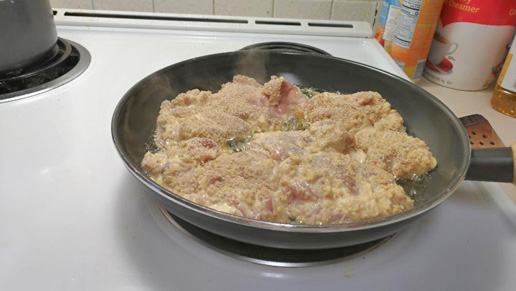Tonight's dinner is in honor of what was perhaps the first epic poem ever written. Over a thousand years before Homer's “Iliad and Odyssey” was the story of Gilgamesh and Enkidu, gay super heroes.
Read a quick story about them after the recipe for some great dinner conversation.
Here is a great way to dress up the boneless skinless chicken thigh. Turn a week day dinner into a fancy evening experience with this tasty marinade.
Ingredients:
4 boneless skinless chicken thighs
1 Egg
1 TBS mayonnaise
1Tbs peach preserves
mix over the pieces of chicken
Add:
1 tsp salt
1 tsp paprika
Chicken seasoning
mix well
Cover and let sit in refrigerator for at least an hour.
Roll in panko crumbs
Saute in olive oil until cooked and temps reach 170 degrees.
Serve with a side of potatoes and a green.
For our music: https://www.youtube.com/watch?v=P94DN0EVfQI bubble boogie
socialslave
To satisfy and restore.
To nourish, support and maintain.
To gratify, spoil, comfort and please,
to nurture, assist, and sustain
…..I cook!
Please buy slave's cookbook:
The Little Black Book of Indiscreet Recipes by Dan White
http://www.amazon.com/dp/B00F315Y4I/ref=cm_sw_r_tw_dp_vAT4sb0934RTM via @amazon
===============================
Gilgamesh was a historical king who reigned in the Mesopotamian city of Uruk in about 2750 BC.
He is the basis for the hero of the Epic of Gilgamesh, considered the oldest story in the world, a 1,000 years older than Homer’s Iliad or the Bible.
The first fragments were found in 1853, written in cuneiform on clay tablets found in the ruins of Nineveh, the ancient capital of Assyria. Cuneiform was not deciphered until 1857.
The Epic is set out on 11 clay tablets, only 3 of which are even close to complete. So early translations are full of gaps and speculations. Over the next 120 years or so, more fragments were found and the language better understood, providing more complete and more fluent translations.
The Epic tells of an arrogant king (Gilgamesh) whom the gods decide to tame by providing him with an equal (Enkidu), his ‘beloved friend’. They have various adventures, one of which results in Enkidu dying.
Gilgamesh’s grief following Enkidu’s death was intense. Gilgamesh then went on to try to discover a way to become immortal, as he didn’t fancy going through the horrors of death, as Enkidu has. He failed.
Gilgamesh is described as caressing Enkidu the way that a man caresses his wife. Enkidu is described as Gilgamesh’s companion of his heart.
There’s also a story of how when Gilgamesh first met Enkidu, they wrestled. After the fight, they embraced and kissed, and held hands like brothers. From then, they walked side by side.
In the Epic of Gilgamesh, he is introduced as "two thirds divine and one third mortal."At the beginning of the poem, Gilgamesh is described as a brutal, oppressive ruler. This is usually interpreted to mean either that he compels all his subjects to engage in forced labor or that he sexually oppresses all his subjects. As punishment for Gilgamesh's cruelty, the god Anu creates the wild man Enkidu. After being tamed by a prostitute named Shamhat, Enkidu travels to Uruk to confront Gilgamesh. In the second tablet, the two men wrestle and, although Gilgamesh wins the match in the end, he is so impressed by his opponent's strength and tenacity that they become close. In the earlier Sumerian texts, Enkidu is Gilgamesh's servant, but, in the Epic of Gilgamesh, they are companions of equal standing. Gilgamesh, according to most versions, will love Enkidu 'like a wife'. Together, they embark on many journeys.
The standard Akkadian Epic of Gilgamesh was composed by a scribe named Sîn-lēqi-unninni, probably during the Middle Babylonian Period , based on much older source material. In the epic, Gilgamesh is a demigod of superhuman strength who loves the handsome man Enkidu.
Goddess Ishtar comes to him and demands him to become her consort. Gilgamesh repudiates her. In revenge, she goes to her father Anu and demands that he give her the Bull of Heaven, which she sends to attack Gilgamesh. Gilgamesh and Enkidu kill the Bull.
While Gilgamesh and Enkidu are resting, Ishtar stands up on the walls of Uruk and curses Gilgamesh. Enkidu tears off the Bull's right thigh and throws it in Ishtar's face, saying, "If I could lay my hands on you, it is this I should do to you, and lash your entrails to your side." Ishtar calls together "the crimped courtesans, prostitutes and harlots" and orders them to mourn for the Bull of Heaven. Meanwhile, Gilgamesh holds a celebration over the Bull of Heaven's defeat.
After Enkidu dies of a disease sent as punishment from the gods, Gilgamesh becomes afraid of his death and visits the sage Utnapishtim, the survivor of the Great Flood, hoping to find immortality. Gilgamesh repeatedly fails the trials set before him and returns home to Uruk, realizing that immortality is beyond his reach.
Most classical historians agree the Epic of Gilgamesh exerted substantial influence on the Iliad and the Odyssey. In On the Nature of Animals by the Greek writer Aelian (2nd century AD). Aelian relates that Gilgamesh's grandfather kept his mother under guard to prevent her from becoming pregnant, because an oracle had told him that his grandson would overthrow him. She became pregnant and the guards threw the child off a tower, but an eagle rescued him mid-fall and delivered him safely to an orchard, where the gardener raised him.
The Epic of Gilgamesh was rediscovered in the Library of Ashurbanipal in 1849. Gilgamesh remained mostly obscure until the mid-20th century, but, since the late 20th century, he has become an increasingly prominent figure in modern culture.
Epic of Gilgamesh itself is included in The Columbia Anthology of Gay Literature (1998) as a major early work of that genre.










